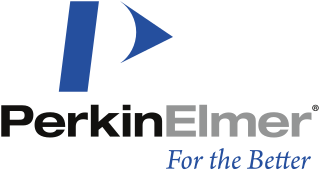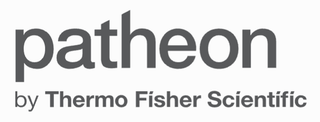
A DNA sequencer is a scientific instrument used to automate the DNA sequencing process. Given a sample of DNA, a DNA sequencer is used to determine the order of the four bases: G (guanine), C (cytosine), A (adenine) and T (thymine). This is then reported as a text string, called a read. Some DNA sequencers can be also considered optical instruments as they analyze light signals originating from fluorochromes attached to nucleotides.
Affymetrix is now Applied Biosystems, a brand of DNA microarray products sold by Thermo Fisher Scientific that originated with an American biotechnology research and development and manufacturing company of the same name. The Santa Clara, California-based Affymetrix, Inc. now a part of Thermo Fisher Scientific was co-founded by Alex Zaffaroni and Stephen Fodor. Stephen Fodor and his group, based on their earlier development of methods to fabricate DNA microarrays using semiconductor manufacturing techniques.
Fisher Scientific International, Inc. was a laboratory supply and biotechnology company that provided products and services to the global scientific research and clinical laboratory markets until its merger with Thermo Electron in 2006, after which it became Thermo Fisher Scientific. The company offered products and services to over 350,000 customers located in approximately 150 countries including pharmaceutical and biotechnology companies, secondary and higher education institutions, hospitals and medical research institutions, and quality control, process control and research and development laboratories.
Invitrogen is one of several brands under the Thermo Fisher Scientific corporation. The product line includes various subbrands of biotechnology products, such as machines and consumables for polymerase chain reaction, reverse transcription, cloning, culturing, stem cell production, cell therapy, regenerative medicine, immunotherapy, transfection, DNA/RNA purification, diagnostic tests, antibodies, and immunoassays.
The Alexa Fluor family of fluorescent dyes is a series of dyes invented by Molecular Probes, now a part of Thermo Fisher Scientific, and sold under the Invitrogen brand name. Alexa Fluor dyes are frequently used as cell and tissue labels in fluorescence microscopy and cell biology. Alexa Fluor dyes can be conjugated directly to primary antibodies or to secondary antibodies to amplify signal and sensitivity or other biomolecules.

PerkinElmer, Inc., previously styled Perkin-Elmer, is an American global corporation that was founded in 1937 and originally focused on precision optics. Over the years it went into and out of several different businesses via acquisitions and divestitures; these included defense products, semiconductors, computer systems, and others. By the 21st century, PerkinElmer was focused in the business areas of diagnostics, life science research, food, environmental and industrial testing. Its capabilities include detection, imaging, informatics, and service. It produced analytical instruments, genetic testing and diagnostic tools, medical imaging components, software, instruments, and consumables for multiple end markets. PerkinElmer was part of the S&P 500 Index and operated in 190 countries.

Danaher Corporation is an American globally diversified conglomerate founded by brothers Steven and Mitchell Rales in 1984. Headquartered in Washington, D.C., the company designs, manufactures, and markets medical, industrial, and commercial products and services. It has primarily grown by acquisitions, and historically has tried to maintain a very low public profile. Danaher was one of the first companies in North America to adopt the Kaizen principles to manufacturing, which is a lean manufacturing Japanese philosophy of continuous improvement and elimination of waste.
Sigma-Aldrich is an American chemical, life science, and biotechnology company owned by the multinational chemical conglomerate Merck Group.
Tracking stock, also known as letter stock and targeted stock, is a specialized equity offering issued by a company that is based on the operations of a defined business within the larger organization. Therefore, the tracking stock will be traded at a price related to the operations of the specific division of the company being "tracked". Tracking stock is typically limited, or has no voting rights. Often, tracking stock is issued to separate a high-growth division from its parent company, while the parent company and its shareholders remain in control of the subsidiary's operations.
Illumina, Inc. is an American biotechnology company, headquartered in San Diego, California, and it serves more than 155 countries. Incorporated on April 1, 1998, Illumina develops, manufactures, and markets integrated systems for the analysis of genetic variation and biological function. The company provides a line of products and services that serves the sequencing, genotyping and gene expression, and proteomics markets.

Thermo Fisher Scientific Inc. is an American supplier of analytical instruments, life sciences solutions, specialty diagnostics, laboratory, pharmaceutical and biotechnology services. Based in Waltham, Massachusetts, Thermo Fisher was formed through the merger of Thermo Electron and Fisher Scientific in 2006. Thermo Fisher Scientific has acquired other reagent, consumable, instrumentation, and service providers, including Life Technologies Corporation (2013), Alfa Aesar (2015), Affymetrix (2016), FEI Company (2016), BD Advanced Bioprocessing (2018), and PPD (2021).

FEI Company was an American company that designed, manufactured, and supported microscope technology. Headquartered in Hillsboro, Oregon, FEI had over 2,800 employees and sales and service operations in more than 50 countries around the world. Formerly listed on the NASDAQ, it is now a subsidiary of Thermo Fisher Scientific.
Molecular Probes was a biotechnology company located in Eugene, Oregon specializing in fluorescence. The company was founded in 1975 by Richard and Rosaria Haugland in their kitchen in Minnesota, then moved briefly to Texas and finally to Oregon in the early 1980s.
Applied Biosystems is one of various brands under the Life Technologies brand of Thermo Fisher Scientific corporation. The brand is focused on integrated systems for genetic analysis, which include computerized machines and the consumables used within them.
Applera Corporation of Norwalk, Connecticut, at #874 on the 2007 Fortune 1000 list, was one of the largest international biotechnology companies based in the United States. It was the successor company to what was the Life Sciences Division of Perkin-Elmer Corporation. Applera was not publicly traded, but instead it consisted of two major groups which are publicly traded tracking stocks in the proteomics industrial sector. These two groups were the S&P 500 listed Applera Corp-Applied Biosystems Group of Foster City, California, and Applera Corp-Celera Genomics Group of Rockville, Maryland. In 2006, the company spun off the Celera Genomics group and changed its name from Applera to Applied Biosystems.
Dharmacon Inc., now known as Dharmacon, was founded in 1995 by Stephen Scaringe as Dharmacon Research to develop and commercialize a new technology for RNA oligonucleotide synthesis. Originally, the company's focus was to develop 2'-ACE RNA technology as the standard for RNA synthesis and to advance RNA oligo-dependent applications and technologies.

Patheon is a service brand within Thermo Fisher Scientific’s brand portfolio. Contract development and manufacturing organization (CDMO) services offered under the Patheon brand include small molecule API, biologics, viral vectors, cGMP plasmids, formulation, clinical trials solutions, logistics and commercial manufacturing and packaging. In 2017, Patheon was acquired by Thermo Fisher Scientific to form its Pharma Services business.
Navigenics, Inc. was a privately held personal genomics company, based in Foster City, California, that used genetic testing to help people determine their individual risk for dozens of health conditions.
SCIEX is a manufacturer of mass spectrometry instrumentation used in biomedical and environmental applications. Originally started by scientists from the University of Toronto Institute for Aerospace Studies, it is now part of Danaher Corporation with the SCIExe R&D division still located in Toronto, Canada.






